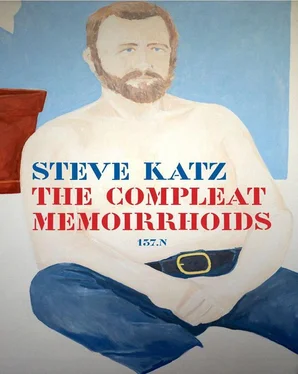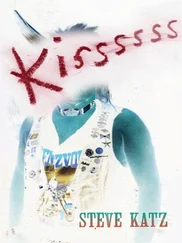Thus I became a subject of the conscienceless pharmaceutical industry. At school my marks for deportment sink through the floor. This lasted through most of junior high school. I developed nasty habits. I rubbed my eyes till they swelled shut. I licked my lips so they scabbed painfully around my mouth. Through a hole in my pocket I masturbated in Latin Class — Gallia in tres partiae divisa est . (Unnhhh.) This self humiliation went on until I realized I needed to take charge, and refused to swallow the pills, which never helped me lose weight anyway. I finally refused to visit Strangelove any more. That experience gave me my deep mistrust of doctors and the medical industry, which I still suffer. One benefit of that sucker therapy has been that it saved me later from exploring the drug. Anything that tastes in my mind of amphetamines, including ecstasy, which is an amphetamine, I push away. Strangelove’s “Zis iss all excess,” continues to worm through my flesh.
The first name I’ll drop is Jackie Terrasonbecause last week I went to hear him on two consecutive nights at Dazzle, a Denver jazz club. He’s a young jazz piano wizard of inexhaustible genius. I felt like I was fifteen and sitting in the “peanut gallery” in Birdland, worshipping at Bud Powell, whose name I drop herewith. At various interviews, after she published her rhapsodic memoir, Just Kids , Patti Smithdiscussed the notion that she could seem like she was dropping names when she talked of the people she hung with at The Chelsea Hotel. But times were different then, she explained, before the infestation of paparazzi and media hype (it was bad enough then). Artists were focused on perfecting their art and defining their place in the culture, and more intent on getting high, on tripping, than looking for exposure and notoriety. As I read her honest and lyrical memoir, almost finished with my own, I think, “Now that’s the life I should have led.”
I spent a month at the Chelsea at the same time Patti Smithand Robert Mapplethorpewere there, but I didn’t get to know them. Mostly I lay about in a small obscure room and occasionally descended to the lobby, or went into El Quixote for a drink or a bite. I was scouting for housing an hour or so from the city, to move my family down from Ithaca. My wife wouldn’t live in New York City so I had to turn down space in a Fluxus building on West Broadway. I spent much of my time driving around on the house search and with some financial help from B.H. Friedmanwe ended up with a place near Pine Bush, New York. My few friends at the Chelsea were in the literary world more than in the world of pop music. The poet, Tom Clark, lived there, as did the writer and dealer Carol Berge. On the elevator once I was shocked to be alone with Janis Joplin. I told her how much I admired her. She smiled and pointed to her throat, and said in a hoarse whisper, “I can’t talk.” That reinforced an insight I’d had about her and Aretha Franklin, that Janis had to surrender everything to create her power, whereas Aretha’s power came from the expectation that no matter how much she put out, she had more in reserve.
If I had been inclined at The Chelsea I might have collected a raft of names out of pop culture to drop at this time. Celebrity has never been attractive to me, has seemed too much like prison. A few of my friends, like Phil Glass, seem to handle it with equanimity. Popular writers these days don’t get as high a ride as popular musicians and to indulge in celebrity at all they coddle a strong sense of self importance. Thomas Pynchonhas seemed to evade and be indulged in it at the same time, as did J.D. Salinger. Russell Bankshas had a powerful sense of his own importance, and perhaps not as much celebrity as he would have liked. Paul Austerhas managed to suck up a lot of attention, and Jonathan Franzen, bless his sour trombone, his books overwritten. The few times celebrity has shown me the glisten of its tentacles I’ve shrunk away. On the other hand I sometimes fret that people don’t pay more attention to my work. I can’t imagine that anybody would want to drop my name — Steve Katz.
During my brief stint in Hollywood, when I was supposed to write a woman’s version of the Charles Bronson Death Wish for Gordon Carrol, producer of Cool Hand Luke , he took me to lunch at a popular movie industry restaurant. “Reservation for Steve Katz,” he blurted into the face of the hostess, at the top of his voice. “That’s the way you get your name known,” he told me. “So it starts with a rape, maybe,” I say. “The script has to be written to a whammo chart,” he explained, and rape was not whammo. I failed that test. Grassland , later known as Hex , and then as Shrieking , the only film I helped write that got on only because of the persistence of the director, Leo Garen. This allowed me to play on the location at the Cheyenne River Sioux Reservation in South Dakota with a group of young actors, some of them later to have big careers — Gary Busey, Keith Carradine, Scott Glenn, Bobby Walker, Jr., Dan Haggerty, Mike Coombs. The women didn’t fare as well, though they were gorgeous — Hilary Thompson, Christina Raines, Doria Cook.
One time at the men’s room in the Atlanta airport I noticed James Brownpissing at the urinal to my right. I said, “You’re James Brown! (as if he didn’t know)” He shushed me by lifting a finger from his dick to his lips. In the Rome airport once I passed Harvey Keitelwith a girl I assumed was his daughter sitting at the first class kiosk waiting for service. Our eyes met, and I knew that he knew that I knew who he was, but it seemed more courteous and friendly not to acknowledge this. When my good writing friend, Rudy Wurlitzer, was in the throes of his ascendance into screenwriter prominence, I had lunch with him and Kris Kristofersonin the East Village. It was chummy. Rudy was always slick at making you envy and pity him at the same time by saying things like, “I’d much rather do dinner with you, man, but I have to meet this guy, Jon Voight, about a project. It’s a drag.” At a pensione in the hills above Spoleto, at dinner with Julie Rubsam, I spotted Giancarlo Menottidining with his family at the next table. I was excited. When I saw Joanne Akalaitisand related this, because she had been directing great Janacekoperas at Bard College, she seemed to disdain my enthusiasm with her silence; after all, she spent most of her time with people who were truly famous. Paul Simonappeared at the party celebrating Peter Schjeldahl’s book of poems, White Country . This was at the same time that Holt published my Exagggerations of Peter Prince . I saw every moment as a chance to celebrate my big book, and expected maybe at least a song in tribute.
Joan Jonas, one of my oldest friends and performance artist legend, was close to the Wooster Group innovative theater bunch, that evolved from Richard Schechner’s Performance Group, modeled in part on Jerzy Grotowski’s theatrical innovations. I went to Cornell with Richard. Joan was a good friend of the Wooster Group’s Willem Dafoe, who came to visit her in Cape Breton, and hiked down to my tipi, which was reachable at the time only by trail through the woods to the sea. At a picnic at Joan’s he cooked a well done hamburger for the self-appointed gate-keeper of the Broad Cove Banks / Site Point Road, Margaret MacDougal, and became part of her life’s legend. Spalding Graywas also Joan’s friend. The remoteness of Cape Breton freaked him out, particularly my wild place. He left almost as soon as he got there. David Byrnevisited Phil’s place once, but I missed him. After Joanne Akalaitisand Phil split up she and a small entourage would come to Cape Breton every July. David Warrilow, the great actor for whom Samuel Beckettwrote several plays, would often visit her. He was down to earth, enjoyed our family. He worked with Mabou Mines theater group. In Keep Busy , a film Robert Frankmade on Margaree Island, he took the lead, with Richard Serra, Rudy, Joan, June Leaf, and others. Alan Arkin, friend of Arthurand Adrienne Yorinks, built a place near Margaree Harbor in Cape Breton. The windows cost more than my whole cottage. He opened his house to gatherings of local children that he and his wife entertained with great generosity.
Читать дальше












